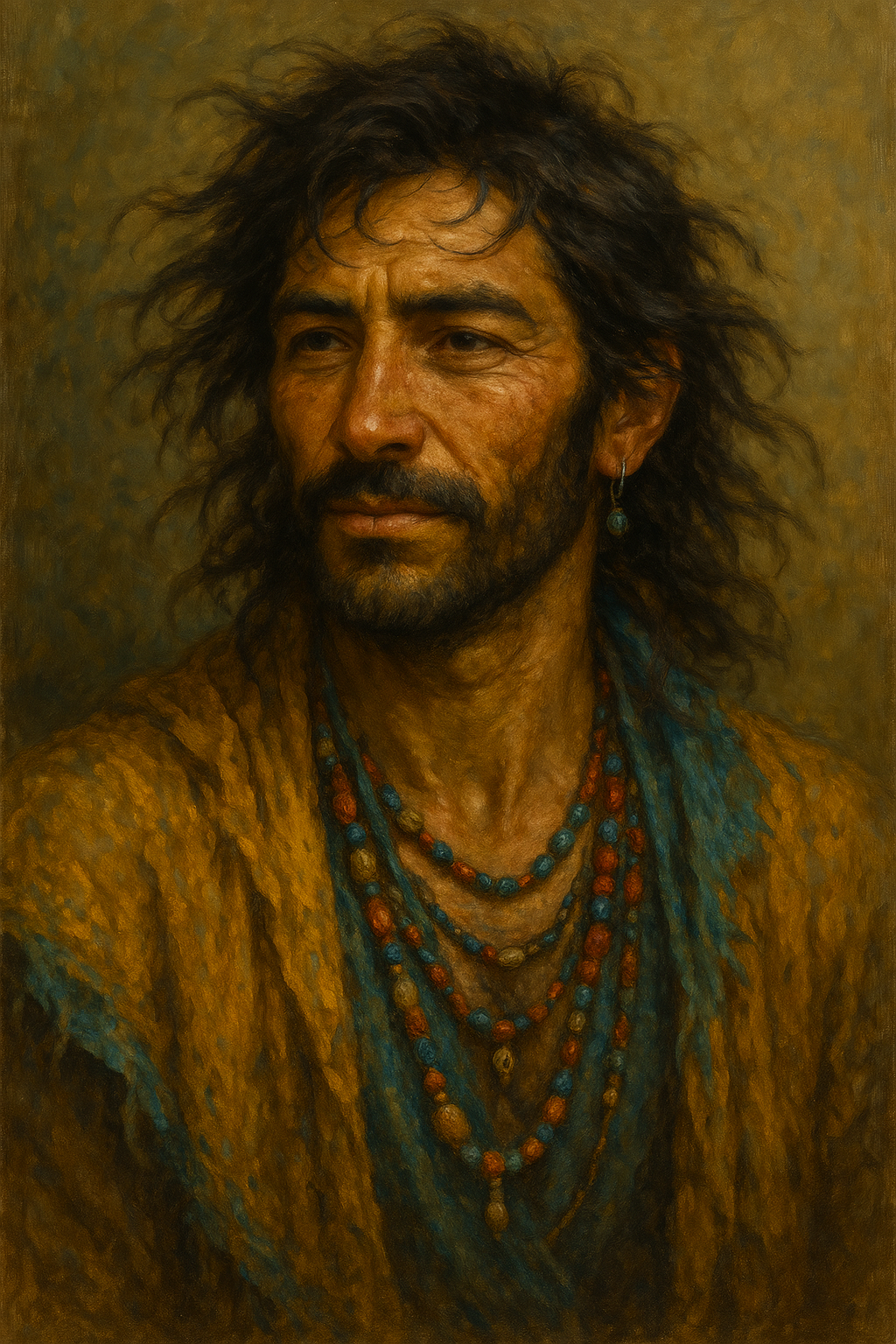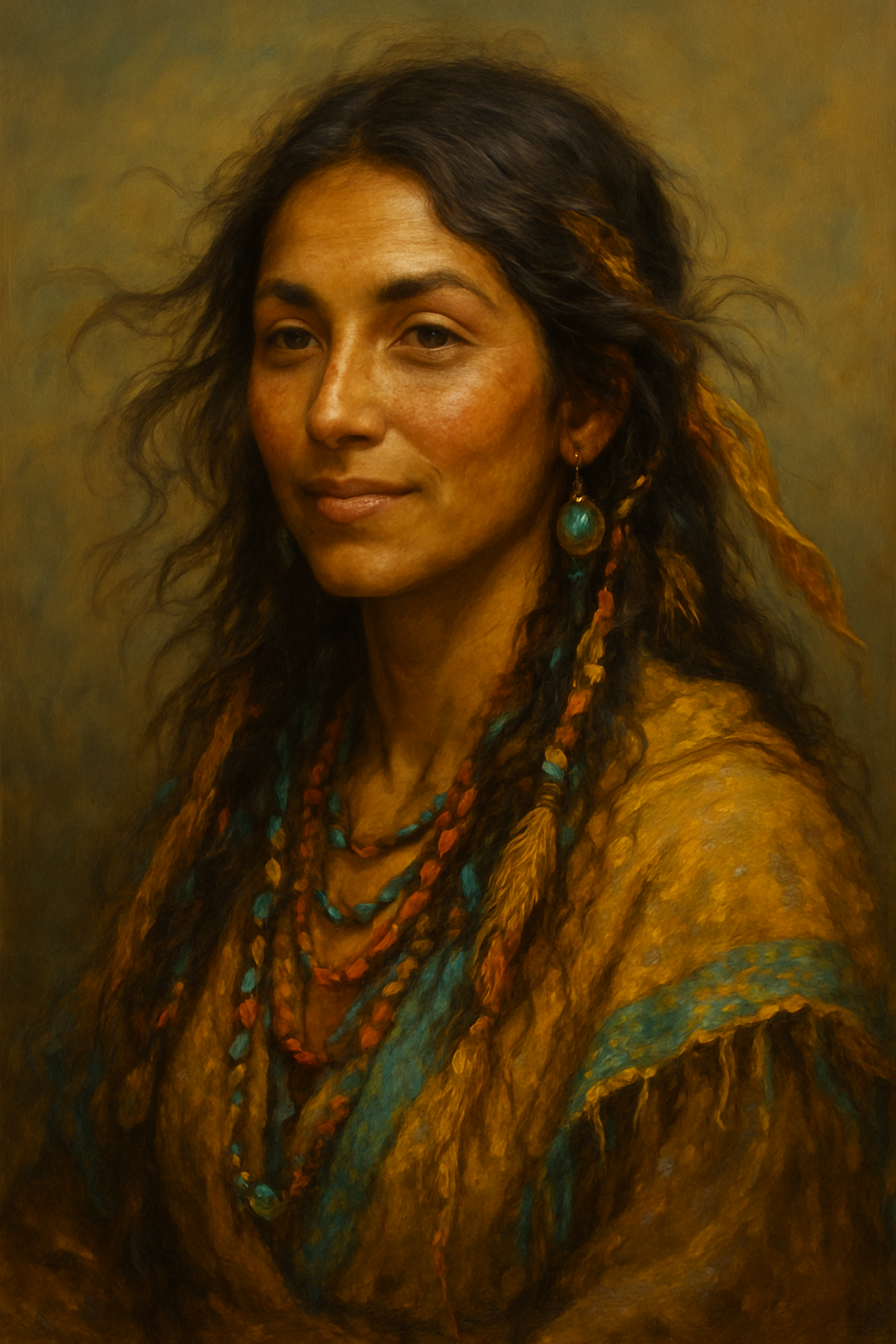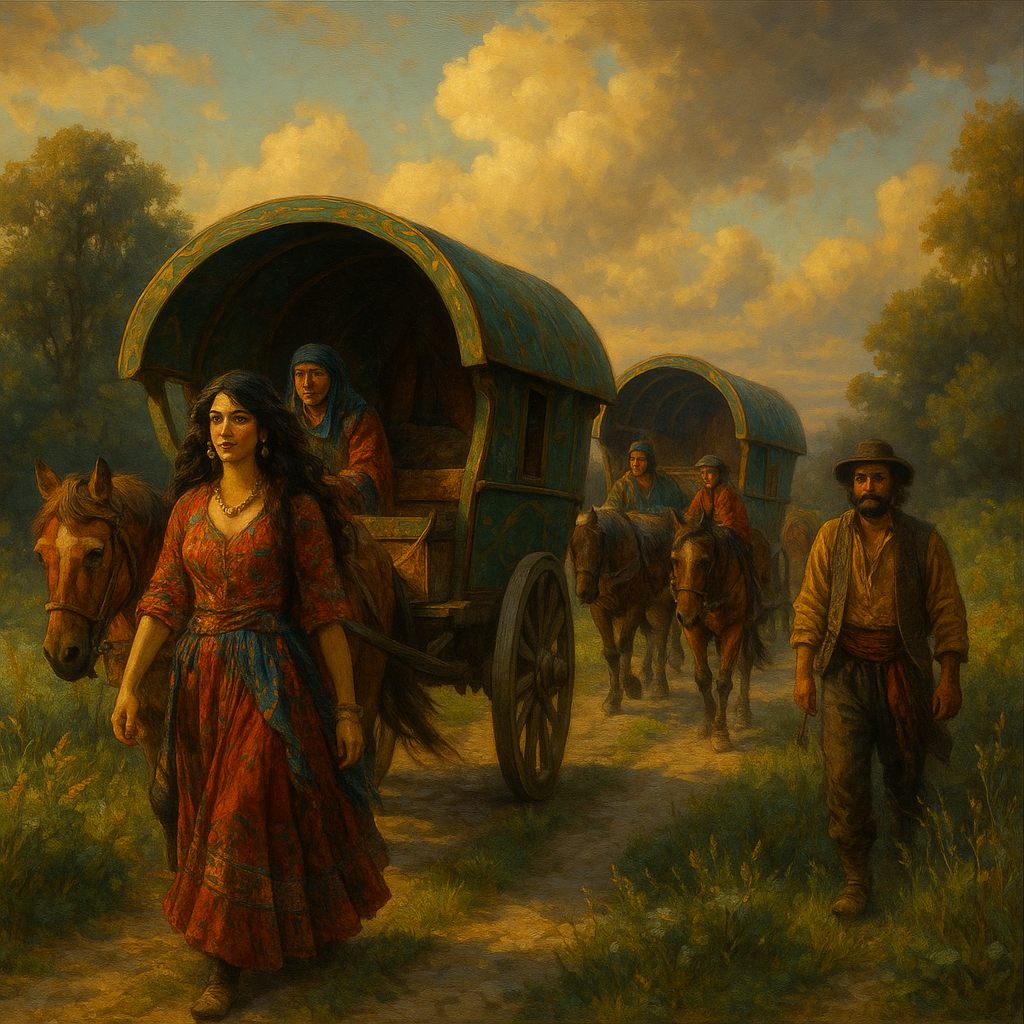Zherani (zheh-RAH-nee)
Once sky-readers, caravan singers, and omen-watchers of a now-vanished homeland, the Zherani are a gentle but resilient people who have wandered Tanaria for generations. Their name, derived from an old word meaning “those who drift with wisdom,” speaks to their deep belief that truth moves, and only the open-hearted can follow it.
They live in light-wheeled wagons and canvas domes, drifting with the winds and seasons. Where they go, they bring music, starlore, and soft prophecy; reading fate in the clouds, the way dust settles, or how smoke curls. Cities both revere and resent them: revere their insight, resent the way truth seems to follow in their wake.
Each Zherani clan holds different traditions, but all share the Creed of the Open Road, a belief that no truth is final, no wound without meaning, and no child ever born rootless.
Their presence is marked by soft bells, painted wagons, and wind-chime prayer charms. Some say a Zherani never stays long, but never leaves without being remembered.
Naming Traditions
Feminine names
Soft, flowing, vowel-heavy—often referencing nature, stars, or memory.
- Nalira
- Virehni
- Ashena
- Tulei
- Zanika
- Meravi
- Selaneth
- Orsai
Masculine names
Strong consonant cores with gentle endings—presence over harshness.
- Dazren
- Ravash
- Tionel
- Keran
- Velior
- Zharek
- Mirenai
- Kalven
Unisex names
Common among wind-readers and dreamwalkers—names with fluid meaning or shifting symbolism.
- Shivai
- Luneth
- Veska
- Tirani
- Azhel
- Nolari
- Zien
- Revah
Family names
Zherani surnames are often poetic, tied to nature, movement, or celestial signs. Inherited through the matriline.
- Velazari – "Of the wind-path"
- Dushari – "Of the soft flame"
- Zhelevan – "Born under stars"
- Karnessi – "From the hill-rooted ones"
- Loravesh – "Those who listen"
- Tirmani – "Travelers of the voice"
- Sarendil – "Moon’s echo"
- Maraveska – "Peacebearers"
Culture
Major language groups and dialects
Though the Zherani originate from a single ancestral tongue, known as Zheranich or sometimes Chiv’dan (“the speech of drift”), centuries of travel, settlement, and adaptation have fractured their language into distinct dialects. Each carries traces of the places they’ve passed through, the cultures they’ve bartered with, and the memories they’ve carried.
High Zheranich
Still spoken in formal songs, rituals, and sacred storytelling, High Zheranich is preserved primarily by elders, memory-keepers, and wind-singers. It’s a lyrical language with flexible word order and poetic structure, relying heavily on metaphor and tone. Many Zherani don’t speak it fluently but know key prayers, songs, or idioms by heart. High Zheranich is also used when addressing spirits, ancestors, or invoking fate. Low Zheranich
The most widely spoken vernacular, Low Zheranich is fluid and adaptive. It incorporates regional loanwords from Eouman, Kamulan, and even Drakorian depending on the caravan’s territory. Grammar is simpler, and tone is warmer—ideal for conversation, trade, and travel. Despite regional differences, Zherani from different clans can usually understand each other with only a few confused phrases. Steppetail Dialect
Used mostly by Zherani living long-term along the plains of Eouma, Steppetail is a clipped, pragmatic dialect that reflects the urgency and efficiency of caravan life. It drops many of the honorifics and poetic forms in favor of direct speech. It’s common among younger Zherani and working riders, especially those who trade regularly with Eouman towns. Stonebranch Dialect
This dialect is common among Zherani who’ve settled near mountainous regions or borderlands and intermingled with more isolated, rural cultures. Stonebranch retains older grammatical forms and uses more guttural consonants and compound verbs. It’s often seen as “stubborn speech” by other Zherani, but it’s revered for preserving traditional idioms lost in other branches. Whisperspeech
Not a dialect in the normal sense, Whisperspeech is a semi-ritualized form of code-talking used in sacred spaces, around the dying, or in emotionally fragile situations. It is slower, softer, and often sung or spoken in fragments, with implied meanings and layered metaphor. Many Zherani say it’s “the language that the wind understands.”
Still spoken in formal songs, rituals, and sacred storytelling, High Zheranich is preserved primarily by elders, memory-keepers, and wind-singers. It’s a lyrical language with flexible word order and poetic structure, relying heavily on metaphor and tone. Many Zherani don’t speak it fluently but know key prayers, songs, or idioms by heart. High Zheranich is also used when addressing spirits, ancestors, or invoking fate. Low Zheranich
The most widely spoken vernacular, Low Zheranich is fluid and adaptive. It incorporates regional loanwords from Eouman, Kamulan, and even Drakorian depending on the caravan’s territory. Grammar is simpler, and tone is warmer—ideal for conversation, trade, and travel. Despite regional differences, Zherani from different clans can usually understand each other with only a few confused phrases. Steppetail Dialect
Used mostly by Zherani living long-term along the plains of Eouma, Steppetail is a clipped, pragmatic dialect that reflects the urgency and efficiency of caravan life. It drops many of the honorifics and poetic forms in favor of direct speech. It’s common among younger Zherani and working riders, especially those who trade regularly with Eouman towns. Stonebranch Dialect
This dialect is common among Zherani who’ve settled near mountainous regions or borderlands and intermingled with more isolated, rural cultures. Stonebranch retains older grammatical forms and uses more guttural consonants and compound verbs. It’s often seen as “stubborn speech” by other Zherani, but it’s revered for preserving traditional idioms lost in other branches. Whisperspeech
Not a dialect in the normal sense, Whisperspeech is a semi-ritualized form of code-talking used in sacred spaces, around the dying, or in emotionally fragile situations. It is slower, softer, and often sung or spoken in fragments, with implied meanings and layered metaphor. Many Zherani say it’s “the language that the wind understands.”
Culture and cultural heritage
The Zherani are a people shaped by motion, spiritual, cultural, and literal. Their culture is woven not into cities or monuments, but into stories, songs, and the wagons they call home. They are a wandering diaspora, tracing ancestral paths across the plains of Tanaria, yet deeply rooted in tradition. What they lack in permanence, they preserve in memory. Every Zherani caravan is a living archive, where customs are passed down through oral histories, ritual dances, and shared meals beneath open skies.
Their cultural heritage is centered on connection, to the land, to each other, and to what came before. Storytelling is not entertainment but a sacred act. Elders are living libraries, and songs carry lineages. The Zherani are known for their wind instruments, harmony-driven chants, and soft percussion, music that flows like the wind they follow. Craftsmanship is also a key element of their identity: they are skilled weavers, charm-makers, and leatherworkers, often trading in intricate goods dyed in natural colors and adorned with meaning.
Spirituality permeates daily life. The Zherani do not worship gods in the conventional sense; instead, they honor the patterns of the world, the sky, the wind, the road, and the unseen. They believe fate is not a straight line but a song, always shifting, always calling. Dreams, weather, and strange coincidences are seen as messages from beyond, and are carefully interpreted by clan seers or wind-readers.
Community is sacred. No one eats alone unless by choice, and every caravan operates through shared consensus, not hierarchy. Age, ability, and identity are respected as part of the whole, and everyone has a role to play, even if that role changes with the season. Though they are often viewed as outsiders by the kingdoms they pass through, the Zherani carry their identity with quiet pride, embroidered in their cloaks, braided into their hair, and whispered in their stories. To be Zherani is to walk lightly, listen deeply, and leave beauty in your wake.
Shared customary codes and values
The Zherani are guided by a deeply rooted code of mutual respect, emotional honesty, and harmony with the world around them. Their culture emphasizes hospitality, consensus, and the importance of legacy. Every voice matters, every step carries meaning, and every kindness given is expected to echo forward. They believe the land remembers how you walk it, and so they strive to leave gentle footprints, both literal and metaphorical. Storytelling, music, and sacred heirlooms carry their truths, while compassion, patience, and resilience define their shared identity. In the Zherani worldview, strength lies not in conquest but in connection.
- “The Path Remembers.” — The Zherani believe every road walked leaves a memory in the land. It is their duty to walk it with respect. Littering, cruelty to animals, or disrupting the natural rhythm of a place is seen as deeply shameful.
- “Every hearth has a voice.” — Around the communal fire, every person—regardless of age, gender, or role—has the right to speak. Decisions are made by consensus, not hierarchy, and silencing someone is a grave insult.
- “Shelter given is shelter owed.” — Hospitality is sacred. If a Zherani offers shelter or food, they do so unconditionally. But the recipient takes on an unspoken debt of respect and, when possible, repayment in kind.
- “Truth sings, even when whispered.” — While they understand discretion, the Zherani value emotional honesty. To hide grief or love too long is considered corrosive to the soul. Music and storytelling are their preferred forms of expression.
- “Carry what you honor.” — Items passed down or kept close must be meaningful: a woven sash, a ring from a departed mother, a shard of home soil. Zherani don’t hoard—they curate the objects that carry their legacy.
- “None walk behind forever.” — The Zherani uplift those who struggle. If someone falters, it’s the caravan’s role to pause, to help them rise, not leave them behind. Even the slowest step has a place in their rhythm.
Common Myths and Legends
The legend of Zhera the Windwalker tells of a prophetic child born during the fading days of the Zherani's ancestral homeland. Gifted with the ability to hear the ancient, silenced Wind, she restored its voice through story and song. In return, the Wind granted her the power to walk without weight and speak with timeless breath. When their homeland was lost, the people followed Zhera’s teachings and took to the road, becoming the Zherani—those who carry memory, song, and the breath of the world wherever they travel. This myth forms the spiritual and cultural cornerstone of the Zherani diaspora.
Ideals
Beauty Ideals
The Zherani don’t believe beauty is something fixed—it’s something that moves with you, like wind over water. Their ideals are shaped by motion, intention, and the marks of a life well-lived. Beauty, to the Zherani, is less about symmetry and more about presence, memory, and subtle transformation.
- Expression over perfection: Lines around the eyes and mouth are admired, they show you’ve smiled, sung, and spoken your truth. A smooth face is seen as inexperienced, not youthful.
- Wind-touched features: Wind-ruffled hair, sun-warmed skin, and calloused fingers are beautiful. Someone who looks like they’ve stood in the weather is someone who’s seen the world.
- Scent and sound: Subtle perfume, often smoke, herbs, or resin, is considered more alluring than flashy makeup. A pleasant speaking or singing voice is deeply attractive.
- Adornment tells your story: Beads, sashes, ribbons, and charms are woven into the hair, or jewelry. Their placement and materials mark important moments: births, deaths, vows, betrayals, healings.
- Movement is elegance: The way one walks, gestures, or dances carries as much weight as physical form. Grace in movement is more desirable than any one facial feature.
- Eyes are the soul’s road-signs: Gaze is important. Someone who looks away too often is hiding something. Someone who stares too long without feeling is considered spiritually untethered.
- Woven charms in braids or sashes
- Smoke-washed shawls or cloaks
- Ear cuffs or nose chains made from river stone, bone, or drift copper
- Ash or pigment used to highlight lines around the eyes and jaw







Marvelous story-telling and a fantastic type of culture to cover for this prompt. I love the depth of their views and how it connects their history to their beliefs now. The traditions are beautiful, and I am reminded of variety of real world influences, but also of lorekeepers of yore from many stories and fantasy realms as well, those groups of whom wander as like voices of the world. I enjoyed learning of the Zherani and am thankful for the opportunity to have learned a bit about them :) Well written, certainly another to tuck away in my collection
I'm glad you liked it. I really wanted to do something inspired by the Romani people, but not the harmful stereotypes and silly tropes people use in most media. I wanted it to have depth and be respectful while also fitting in with the rest of my lore.
"Every story is a thread, and together we weave worlds."
The Origin of Tanaria
You definitely achieved that balance I think I could certainly see that influence yet it didn't feel...tropey or stereotypical at all. The influence was there but felt as one of many and not just solely focused on, the elements pulled feeling as if care was taken with them. So I'd say that you did a fine job.
I appreciate the kind words.
"Every story is a thread, and together we weave worlds."
The Origin of Tanaria